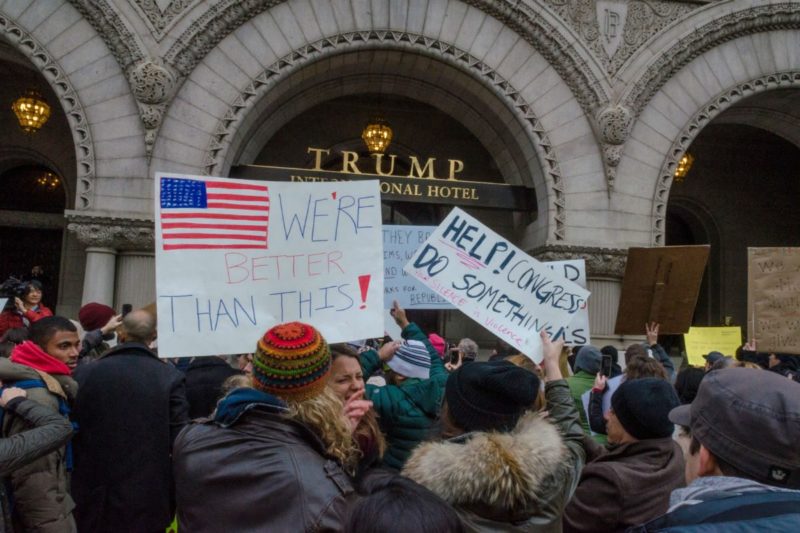The Trump Administration Is Apparently Ignoring Court Orders
According to a group of lawyers in Los Angeles, despite several court orders requiring President Donald Trump to stop deporting people via his Refugee and Visa Order, it's still happening.

We here at Team Legal are deeply concerned about the Trump administration and its apparent willingness to discard institutional norms, good faith, and, frankly, common sense. We warned you on Monday that the administration has already proven it will bend the law to foster chaos and stifle dissent.
Well, here’s an example of what we were talking about.
According to a group of lawyers in Los Angeles, despite several court orders requiring President Donald Trump to stop deporting people via his Refugee and Visa Order, it’s still happening.
Over the weekend, they say, an Iranian green-card holder named Ali Khoshbakhti Vayeghan arrived in the United States, was refused admission, and was put on a plane and sent to Dubai on the way to Iran. One group of lawyers working on behalf of Vayeghan issued a statement on Monday detailing their efforts to secure his return. According to that statement, they worked out of Los Angeles International Airport (LAX) all weekend in an unsuccessful attempt to get Customs and Border Protection (CBP) officials to comply with the court orders issued by federal courts in New York (Darweesh v. Trump) and Massachusetts (Louhghalam v. Trump), which temporarily stayed the Refugee and Visa Order.
In addition, a federal judge in California issued a temporary restraining order specifically blocking the Trump administration from barring the return of Ali Vayeghan.
So in total, Vayeghan’s attorneys had three court orders from three separate courts. And at this point, CBP appears to be ignoring all three.
Technically, CPB officials are permitted to ignore the orders until they have “formal notice” of them. This usually means someone like a process server, like a deputy or sheriff, formally delivers legal papers to them. You’ve seen process servers in movies ambushing elusive ne’er-do-wells as they attempt to provide notice of a lawsuit. Until then, CPB officials could technically argue they didn’t know about the orders, even though such an argument is a joke. Here’s why.
Service of process is the “formal notice” that triggers a person or government agency to comply with orders and prevents them from claiming willful ignorance of the events unfolding all around them. That’s usually not a problem. In fact, even though litigators often engage in bruising fights, there is usually a sense of professional decorum and respect—a formal “heads up” to the other side that a lawsuit is coming or a motion will be filed.
As we’ve established, though, these are not normal times.
In this case, the task of delivering notice falls on U.S. marshals to serve the federal orders on the CBP. The service is the enforcement arm of the federal courts, as outlined by federal law:
It is the primary role and mission of the United States Marshals Service to provide for the security and to obey, execute, and enforce all orders of the United States District Courts, the United States Courts of Appeals, the Court of International Trade, and the United States Tax Court, as provided by law.
Federal law also requires the U.S. Marshals Service to “execute all lawful writs, process, and orders issued under the authority of the United States,” and “command all necessary assistance to execute its duties.”
That means the U.S. marshals are required to serve the court orders blocking the deportations. And, in turn, CBP is required to comply with the court order and cease deportations.
But that doesn’t seem to be happening. According to the statement issued by Vayeghan’s attorneys, the marshal’s office “has so far failed to serve process and instead represents that it has been instructed by its Office of the General Counsel to await instruction from the U.S. Attorney’s office.”
This is bad. This is very, very bad.
The attorney general is part of the executive branch. The U.S. marshals are a part of the judiciary. It’s not up to the attorney general to instruct the U.S. marshals to serve the court orders on the CBP. The U.S. marshals are federally required to do so.
So here we see another fine example of the Trump administration’s willingness to flout the rule of law. Surely, they are waiting for Sen. Jeff Sessions to be confirmed as U.S. attorney general so he can begin to use the U.S. Department of Justice—which, again, is part of the executive branch—to strong-arm the judicial branch. If the marshals are already ignoring traditional checks and balances, especially considering Monday night’s dismissal of Acting Attorney General Sally Yates, it is clear that the Trump administration believes it can fully insulate itself from judicial review. And it is not entirely clear how we can stop it.
This is a crisis, people.
